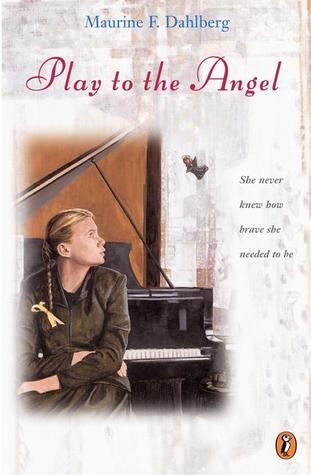 |
| Click to view on Goodreads |
(192 pages)
This is a beautiful book that I'd read a long time ago, but almost completely forgotten. Seeing it in a bin at a book swap, I snatched it and brought it home so I could re-read it (and also, figure out which book it was - I had it muddled up with another WWII book that I still haven't been able to track down).
It really is a great story, and even though I can never entirely relate to piano-prodigy main characters (because who'm I kidding? I am so not a piano prodigy - I quit as soon as my parents let me!), I still love reading about people like Greta who are so dedicated to their art. I also like looking at the Holocaust from different angles, and the Viennese view of events has always particularly fascinated me. I can't imagine how terrible it must have been to be one minute a safe, independent country and the next minute - to not be.
I also have a penchant for characters with Hemophilia. I know that Kurt isn't actually in the book itself (he died before the book began), but his shadow hangs over the entire story, and I appreciated getting a look at the aftermath of the tragic disease. Kurt isn't just defined by his hemophilia, though, and I thought he was pretty well-fleshed out for not even being in the book at all. Greta is very obviously heartbroken about his death, and struggles with the conflict between trying to get out from under his legacy and forge her own name, and not wanting to give him up entirely.
I can't say I'm a big fan of Greta's mother, though. Actually, I really didn't like her. I don't care if she was so broken up about Kurt's death; she shouldn't have written Greta off like that! She's so wrapped up in mourning him, and trying to get herself together enough to move past his death, that she's completely blind to all that she's missing with her daughter. I know things were hard for her, but still. Also, she thought Hitler was a good guy for most of the book! I know she didn't really understand the horrors of what he was doing, but still. Not a big draw for me.
I did love Herr Kimmel, though, and I liked how his backstory tied Greta's piano-playing together with the events that were unfolding at the beginning of WWII. I really liked the ending, when everything came together, and I closed the book with a nice satisfied feeling.
I highly recommend Play to the Angel to anyone who thinks it looks interesting, and will definitely keep it in mind going forward, as a go-to WWII book for anyone who wants a good WWII book (including younger kids not yet ready for the more gruesome books about concentration camps, Nazi cruelty, etc).
This is a beautiful book that I'd read a long time ago, but almost completely forgotten. Seeing it in a bin at a book swap, I snatched it and brought it home so I could re-read it (and also, figure out which book it was - I had it muddled up with another WWII book that I still haven't been able to track down).
It really is a great story, and even though I can never entirely relate to piano-prodigy main characters (because who'm I kidding? I am so not a piano prodigy - I quit as soon as my parents let me!), I still love reading about people like Greta who are so dedicated to their art. I also like looking at the Holocaust from different angles, and the Viennese view of events has always particularly fascinated me. I can't imagine how terrible it must have been to be one minute a safe, independent country and the next minute - to not be.
I also have a penchant for characters with Hemophilia. I know that Kurt isn't actually in the book itself (he died before the book began), but his shadow hangs over the entire story, and I appreciated getting a look at the aftermath of the tragic disease. Kurt isn't just defined by his hemophilia, though, and I thought he was pretty well-fleshed out for not even being in the book at all. Greta is very obviously heartbroken about his death, and struggles with the conflict between trying to get out from under his legacy and forge her own name, and not wanting to give him up entirely.
I can't say I'm a big fan of Greta's mother, though. Actually, I really didn't like her. I don't care if she was so broken up about Kurt's death; she shouldn't have written Greta off like that! She's so wrapped up in mourning him, and trying to get herself together enough to move past his death, that she's completely blind to all that she's missing with her daughter. I know things were hard for her, but still. Also, she thought Hitler was a good guy for most of the book! I know she didn't really understand the horrors of what he was doing, but still. Not a big draw for me.
I did love Herr Kimmel, though, and I liked how his backstory tied Greta's piano-playing together with the events that were unfolding at the beginning of WWII. I really liked the ending, when everything came together, and I closed the book with a nice satisfied feeling.
I highly recommend Play to the Angel to anyone who thinks it looks interesting, and will definitely keep it in mind going forward, as a go-to WWII book for anyone who wants a good WWII book (including younger kids not yet ready for the more gruesome books about concentration camps, Nazi cruelty, etc).
No comments:
Post a Comment
Join the conversation!